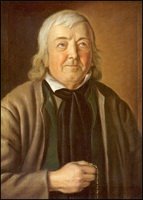Niklaus Wolf von Rippertschwand
Niklaus Wolf , often Niklaus Wolf von Rippertschwand , or father Wolf for short (born May 1, 1756 in Unterlindig near Neuenkirch , † September 18, 1832 in St. Urban LU ), was a Roman Catholic farmer, politician and pious healer from the canton Lucerne , Switzerland . He came from the hamlet of Rippertschwand near Neuenkirch.
resume
When Niklaus was twelve years old, the family moved to Rippertschwand, where the parents took over the farm. At the age of 19 he went on a pilgrimage to Rome, from which he returned deeply impressed. On February 8, 1778, he married Barbara Müller from Neuhus. Nine children were given to the couple, four of whom died early. As a farmer, he studied and tried out new methods of agriculture. Wolf taught his children himself. In the evening he held a house service with his family and the employees, and in the morning he hiked with one or more children to mass in Neuenkirch.
Politics and prayer

In February 1798 he was elected as a representative in the Lucerne parliament. He hoped to be able to change a few things through his political office. Under the influence of the French Revolution, everything that had to do with the church was suspected; many monasteries were closed. In 1799, the Confederation was occupied by French and Russian troops who fought against each other. French troops were quartered in monasteries and churches were misappropriated. These conditions drove Niklaus Wolf into prayer: “I think that we men should, instead of just politicizing, meet regularly for prayer. There would have to be an army [of prayers] that could do more than Napoleon did with his soldiers. ”
From 1803 to 1805, Wolf was a member of the Grand Council in Lucerne, but withdrew because he felt powerless against the anti-religious spirit prevailing there. From 1809 to 1811 Wolf was the mayor of Neuenkirch.
Service to the sick
He read with interest the writings that were written for and against the faith healer and exorcist Johann Joseph Gaßner (1727–1779). He began to deal with the healing of the sick . Mk 16.17-18 EU played a key role in this : These signs will accompany those who believe: In my name they will cast out demons; they will speak in new tongues, they will pick up [poisonous] snakes, and if they drink something deadly it will not harm them; They will lay hands on the weak, and they will be well, and the sick they lay hands on will get well. Around 1805 he discovered the gift of healing the sick and was able to help many sick people as a result. At the age of 50 he therefore handed the farm over to his son Johann to devote himself entirely to this service. In 1810 he was elected to the church council. His envious got the fact that in 1815 he was forbidden by the state and church to cure the sick. At the insistence of the people, however, this ban was lifted the following year; Wolf received permission from his church to heal the sick and instruct the people.
On September 9, 1832, he suffered a stroke in the St. Urban monastery ; he died nine days later. He has been buried in an honorary grave in the Neuenkirch pilgrimage church since 1952 .
effect
Father Wolf had a great influence on the conservative politician Josef Leu von Ebersol .
Numerous prayer groups were founded by Wolf, which continued to exist after his death and which later formed a brotherhood. A brotherhood festival or religious festival is celebrated in Neuenkirch to this day in September. There is also a Father Wolf Chapel there in his memory.
Wolf is currently in a process of beatification .
literature
- Anselm Keel: Niklaus Wolf von Rippertschwand. The vertical lateral thinker , Paulus-Verlag: Freiburg im Üechtland 2002, ISBN 3-7228-0397-7 .
- Ida Lüthold-Minder : Enlightened layman. Niklaus Wolf von Rippertschwand (1756-1832) , Miriam-Verlag: Jestetten 1995, ISBN 3-87449-252-4 .
- Ida Lüthold-Minder: The power of prayer. Life and work of Niklaus Wolf von Rippertschwand , Miriam-Verlag: Jestetten 1995, ISBN 3-87449-253-2 .
- Ekkart Sauser : Wolf, Nikolaus: farmer and healer. In: Biographisch-Bibliographisches Kirchenlexikon (BBKL). Volume 23, Bautz, Nordhausen 2004, ISBN 3-88309-155-3 , Sp. 1578-1579.
Web links
- Niklaus Wolf Foundation Neuenkirch
- Short biography ( Memento from September 28, 2007 in the Internet Archive )
- Literature by and about Niklaus Wolf von Rippertschwand in the catalog of the German National Library
Remarks
- ↑ Homepage of the Roman Catholic Parish St. Ulrich Neuenkirch , accessed on August 27, 2012.
| personal data | |
|---|---|
| SURNAME | Wolf von Rippertschwand, Niklaus |
| ALTERNATIVE NAMES | Wolf, Niklaus; Father wolf |
| BRIEF DESCRIPTION | Swiss farmer and healer |
| DATE OF BIRTH | May 1, 1756 |
| PLACE OF BIRTH | Unterlindig near Neuenkirch |
| DATE OF DEATH | September 18, 1832 |
| Place of death | St. Urban LU |
